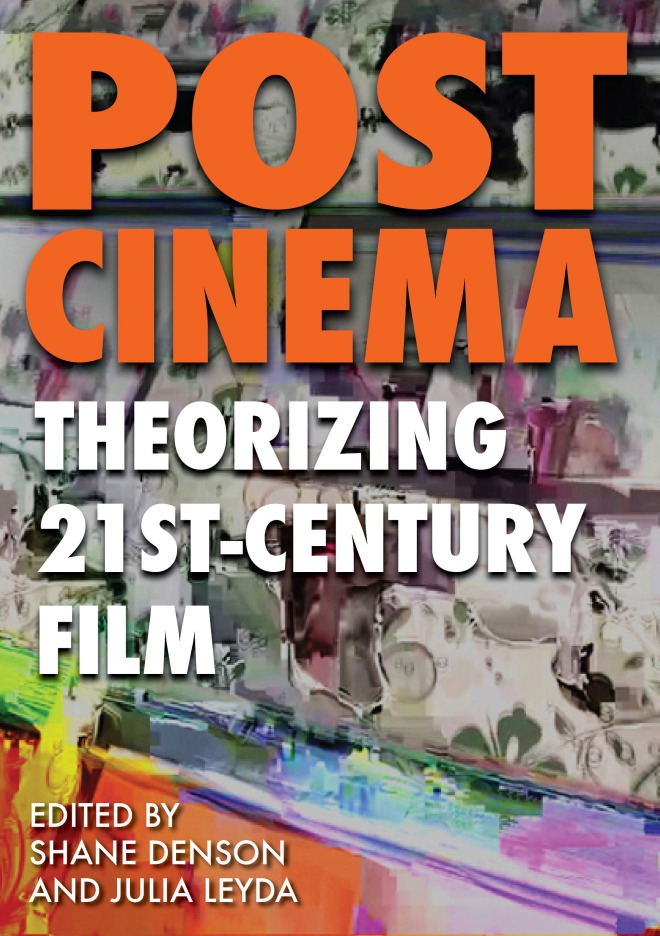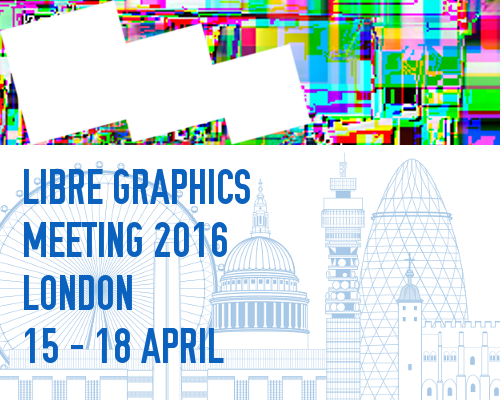Denson Turner Media Tech Theory Syllabus 2020 by medieninitiative on Scribd
Syllabus for “Media Technology Theory,” which I’ll be co-teaching Spring 2020 with Fred Turner.
Denson Turner Media Tech Theory Syllabus 2020 by medieninitiative on Scribd
Syllabus for “Media Technology Theory,” which I’ll be co-teaching Spring 2020 with Fred Turner.

I am happy to announce, at long last, the publication of Post-Cinema: Theorizing 21st-Century Film, edited by Shane Denson and Julia Leyda, which is out today as a completely free and open-access volume with REFRAME Books.
If cinema and television, as the dominant media of the 20th century, shaped and reflected our cultural sensibilities, how do new digital media in the 21st century help to shape and reflect new forms of sensibility? In this collection, editors Shane Denson and Julia Leyda have gathered a range of essays that approach this question by way of a critical engagement with the notion of “post-cinema.” Contributors explore key experiential, technological, political, historical, and ecological aspects of the transition from a cinematic to a post-cinematic media regime and articulate both continuities and disjunctures between film’s first and second centuries.
The book will appear in several digital formats: the web-based version is online today, and several ebook formats will be appearing soon.
The book brings together foundational texts by some of the key voices in the discussion of post-cinema and places them next to a range of brand-new chapters, as well as a series of roundtable discussions.
The long list of contributors includes:
Caitlin Benson-Allott, Paul Bowman, Felix Brinker, Kristopher L. Cannon, Francesco Casetti, Steen Christiansen, Elena del Río, Shane Denson, Rosalind Galt, Therese Grisham, Richard Grusin, Leon Gurevitch, Mark B. N. Hansen, Bruce Isaacs, Adrian Ivakhiv, Kylie Jarrett, Selmin Kara, Julia Leyda, Patricia MacCormack, Lev Manovich, Ruth Mayer, Michael O’Rourke, Patricia Pisters, Alessandra Raengo, David Rambo, Nicholas Rombes, Sergi Sánchez, Karin Sellberg, Steven Shaviro, Michael Loren Siegel, Vivian Sobchack, Billy Stevenson, Andreas Sudmann
Here is the table of contents:
A brief “press release” with a description of the book and the complete table of contents is available here (opens as a PDF): POST-CINEMA-Press-Release

Recently, I posted about a project called after.video, which contains an augmented (AR) glitch/video/image-based theory piece that Karin Denson and I collaborated on. It has now been announced that the official launch of after.video, Volume 1: Assemblages — a “video book” consisting of a paperback book and video elements stored on a Raspberry Pi computer packaged in a VHS case, which will also be available online — will take place at the Libre Graphics Meeting 2016 in London (Sunday, April 17th at 4:20pm).

I just saw the official announcement for this exciting project, which I’m proud to be a part of (with a collaborative piece I made with Karin Denson).
after.video, Volume 1: Assemblages is a “video book” — a paperback book and video stored on a Raspberry Pi computer packaged in a VHS case. It will also be available as online video and book PDF download.
Edited by Oliver Lerone Schultz, Adnan Hadzi, Pablo de Soto, and Laila Shereen Sakr (VJ Um Amel), it will be published this year (2016) by Open Humanities Press.
The piece I developed with Karin is a theory/practice hybrid called “Scannable Images: Materialities of Post-Cinema after Video.” It involves digital video, databending/datamoshing, generative text, animated gifs, and augmented reality components, in addition to several paintings in acrylic (not included in the video book).
Here’s some more info about the book from the OpenMute Press site:
Theorising a World of Video
after.video realizes the world through moving images and reassembles theory after video. Extending the formats of ‘theory’, it reflects a new situation in which world and video have grown together.
This is an edited collection of assembled and annotated video essays living in two instantiations: an online version – located on the web at http://after.video/assemblages, and an offline version – stored on a server inside a VHS (Video Home System) case. This is both a digital and analog object: manifested, in a scholarly gesture, as a ‘video book’.
We hope that different tribes — from DIY hackercamps and medialabs, to unsatisfied academic visionaries, avantgarde-mesh-videographers and independent media collectives, even iTV and home-cinema addicted sofasurfers — will cherish this contribution to an ever more fragmented, ever more colorful spectrum of video-culture, consumption and appropriation…
Table of Contents
Control Societies
Peter Woodbridge + Gary Hall + Clare Birchall
Scannable images: materialities of Post-Cinema after Video
Karin + Shane Denson
Isistanbul
Serhat Köksal
The Crying Selfie
Rózsa Zita Farkas
Guided Meditation
Deborah Ligotrio
Contingent Feminist Tacticks for Working with Machines
Lucia Egaña Rojas
Capturing the Ephemeral and Contestational
Eric Kiuitenberg
Surveillance Assemblies
Adnan Hadzi
You Spin me Round – Full Circle
Andreas TreskeEditorial Collective
Oliver Lerone Schultz
Adnan Hadzi
Pablo de Soto
Laila Shereen Sakr (VJ Um Amel)Tech Team
Jacob Friedman – Open Hypervideo Programmer
Anton Galanopoulos – Micro-Computer ProgrammerProducers
Adnan Hadzi – OHP Managing Producer
Jacob Friedman – OHV Format Development & Interface Design
Joscha Jäger – OHV Format Development & Interface Design
Oliver Lerone Schultz – Coordination CDC, Video Vortex #9, OHPCover artwork and booklet design: Jacob Friedman
Copyright: the authors
Licence: after.video is dual licensed under the terms of the MIT license and the GPL3
http://www.gnu.org/licenses/gpl-3.0.html
Language: English
Assembly On-demand
OpenMute PressAcknowledgements
Co-Initiated + Funded by
Art + Civic Media as part of Centre for Digital Cultures @ Leuphana University.
Art + Civic Media was funded through Innovation Incubator, a major EU project financed by the European Regional Development Fund (ERDF) and the federal state of Lower Saxony.Thanks to
Joscha Jaeger – Open Hypervideo (and making this an open licensed capsule!)
Timon Beyes – Centre for Digital Cultures, Lüneburg
Mathias Fuchs – Centre for Digital Cultures, Lüneburg
Gary Hall – School of Art and Design, Coventry University
Simon Worthington – OpenMute
http://www.metamute.org/shop/openmute-press/after.video

On January 21, 2015 (3:00-4:00pm), the S-1 Speculative Sensation Lab will be presenting a collaborative artwork titled Manifest Data at The Edge, the new space in Duke University’s Bostock Library devoted to “interdisciplinary, data-driven, digitally reliant or team-based research.”
Manifest Data brings together programmers, 3-D printing specialists, sculptors, and theorists to reflect on the production of value in the digital age, the materiality of information, and the (non-)place of mediated relations.
Code written by Luke Caldwell captures data that would otherwise be leaked as we browse the web, and exploited by the likes of Google and Facebook; in a second step, this data is transformed into a coordinate system that can be mapped as a 3D object. In collaboration with other lab members, artist Libi Striegl prepares and prints out the resulting “data creatures.” Karin Denson has reimagined these forms as beautifully grotesque garden gnomes — thus reappropriating a figure that has become a symbol for 3D printing and a marketing tool for companies like MakerBot. Together, Karin and I have further translated these figures into the hybrid spaces of augmented reality, planting the gnomes strategically and in such a way as to instantiate a very personal system for creating value that — dare we hope? — is immune to corporate cooptation. Lab members David Rambo and Max Symuleski, among others, round out the project with artistic-theoretical statements connecting the project of Manifest Data with a critical questioning of contemporary manifest destiny and a new phrenology for the digital age.
The S-1 Lab is directed by Mark B. N. Hansen and Mark Olson in the Media Arts + Sciences Program at Duke. The Manifest Data project was initiated by Amanda Starling Gould, who has continued to provide it with a guiding aesthetic-theoretical vision.
More information about the presentation, which happens to be the inaugural presentation in the “What I Do With Data” series of the Digital Scholarship Services at Duke, can be found here.